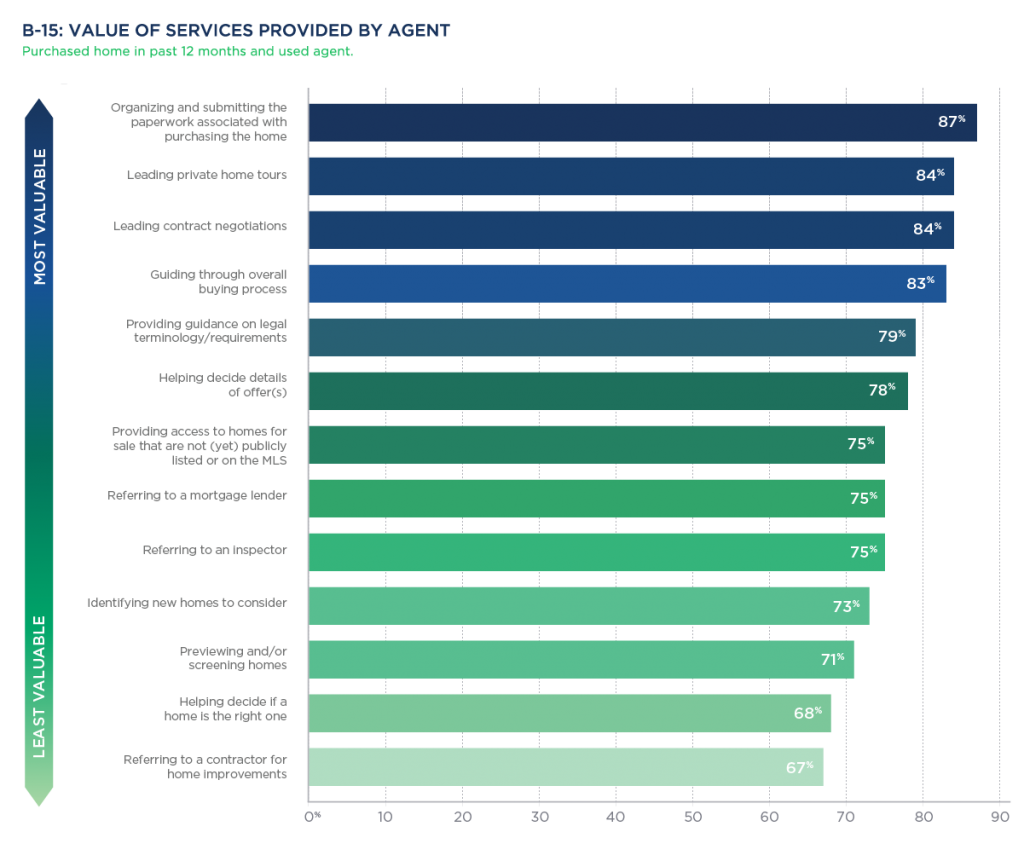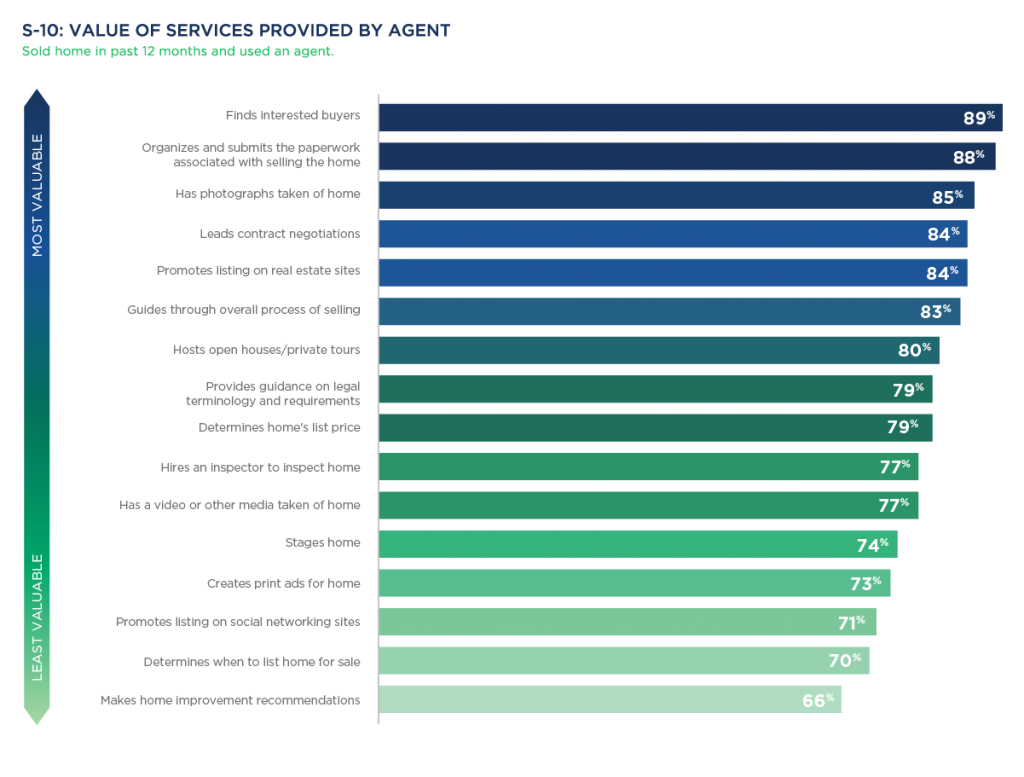6 min read
Real Estate Agent vs. Broker: What's the Difference?
There are several types of real estate agents and brokers, and understanding the difference can be valuable in considering a career.

In this article:
- What does a real estate broker do?
- What are the types of real estate brokers?
- What does a real estate agent do?
- Reasons to become a licensed real estate broker
- What are the types of real estate agents?
- How to become a real estate agent or broker
Do you know the difference between a real estate agent and a broker? While laws vary by state, a real estate agent is primarily anyone who has obtained a real estate license. A real estate broker is an agent who has also passed their broker license exam. The main difference between a real estate agent and broker is that a real estate broker can own a firm or be an independent contractor, while a real estate agent must work under the supervision of a broker.
There are several types of real estate agents and brokers, and understanding the difference can be valuable when determining which real estate career path is right for you.
What does a real estate broker do?
A real estate broker works to negotiate and arrange real estate transactions. They can work independently or at a brokerage with real estate agents under them. The tasks a broker performs may vary depending on their role. Generally, real estate brokers are responsible for:
- Recruiting, training and managing real estate agents
- Writing contracts
- Supervising real estate transactions
- Managing the brokerage office and staff
- Communicating with government and professional associations
What are the types of real estate brokers?
Each real estate broker's license requirements and responsibilities will vary by state. In general, there are three roles that a broker may perform:
Designated broker
A designated real estate broker, or principal broker, oversees all licensed real estate agents at a firm and ensures that agents are operating in compliance with local and national real estate law. At a real estate firm, the designated broker is the one person who holds the license for the firm, and can be paid a salary instead of commission. Each firm must have a designated broker for each state the firm is licensed to operate in, although a designated broker can oversee multiple states.
Managing broker
A managing broker, or broker-in-charge, oversees the day-to-day operation of the office. This broker is directly under the designated broker and can be responsible for:
- Hiring real estate agents
- Training new real estate agents
- Supervising administrative staff
- Managing compliance, recordkeeping and vendor relationships
Associate broker
An associate broker is similar to a real estate agent in that they represent buyer and seller transactions. However, they can do so without supervision by a broker (and may receive a larger percent of the commission because of this).
What does a real estate agent do?
A real estate agent assists and represents clients during the buying, selling or renting process. Many agents work full time under a licensed brokerage. Some people choose to become a part-time real estate agent at the beginning of their career or after retirement, but they typically still need to work under a brokerage.
While responsibilities vary by state, most agents are responsible for:
Providing guidance through the overall process: Buying and selling a home can be overwhelming, and a real estate agent helps their client through each step of the process.
Organizing and submitting documentation: A real estate agent can help ensure all of the client's paperwork is in order, from the preapproval process to the final closing documents. We found that 87% of buyers and 88% of sellers value an agent who organizes and submits the paperwork.
Facilitating contract negotiations: From sales price to amenities to home repairs, a real estate agent will help their client obtain the best possible deal.
Zillow Premier Agents have access to exclusive tools to help with the process, including a CRM tool that allows agents to easily communicate with clients and create a My Agent relationship.
Reasons to become a licensed real estate broker
As a real estate agent, you can further your career by becoming a licensed real estate broker. Taking this next step can mean:
Additional income. In general, a broker may be able to earn a higher annual income due to better commission splits and an increased number of transactions. But just having the broker title doesn't earn you more.
Autonomy: While success or failure falls on your shoulders, you'll have total control over decisions that determine your success.
What are the types of real estate agents?
There are four main roles of real estate agents: Buyer's agents, listing agents, dual (or transactional) agents and referral agents. Depending on the state, responsibilities may vary, but here’s a general idea of each agent role:
Buyer's agent
A buyer's agent represents the home buyer. They assist the buyer through the entire process, including:
- Helping finalize the details of an offer
- Suggesting a mortgage lender, home inspector or contractor
- Identifying new homes the client may like
- Going on walkthroughs of homes with the client
- Helping a client decide if a home is right for them
Buyers tend to favor specific qualities in a buyer’s agent. Here's what we found:

Listing agent
A listing agent represents the homeowner through the selling process. Their duties can include:
- Helping to recommend a sales price
- Finding interested buyers
- Taking photographs or videos of the home
- Arranging to have the home staged
- Promoting the listing on real estate and social networking sites
- Creating print ads for the home
- Hosting open houses, showings or private tours
- Making home improvement recommendations
- Hiring a home inspector
Sellers also value listing agents for some qualities over others:

Dual or transactional agent
In some instances, an agent may represent both the buyer and the seller — essentially becoming a facilitator. Dual agency is illegal in some places and requires disclosure in others, so be sure to understand your state's laws.
Referral agent
A referral agent finds leads and sends them to licensed real estate agents — they’re not licensed to sell real estate, manage property or handle real estate transactions themselves. When a lead they sent to a real estate agent closes on a sale, the referral agent gets paid a referral fee.
How to become a real estate agent or broker
The requirements to become a real estate agent or broker vary by state. Check your local licensing board for your jurisdiction to see the requirements for your area. In general, you may need to:
Meet your state's minimum licensing requirements. These are usually broad requirements, such as being over 18 years old and having a high school diploma.
Complete real estate prelicensing courses. Prelicensing courses typically cover both state-specific and federal laws and regulations.
Pass your state's real estate license exam. Your state will have a minimum passing score that you’ll be required to meet.
Work under a licensed broker. The amount of time (if any) you may have to spend working under a broker will vary, but it's a good idea to work under one for at least six months to a year; the broker will act as your mentor and show you the ropes.
Obtain a real estate license. After satisfying all the requirements, you’ll submit an application for a real estate license. You may also be required to submit to fingerprinting and a background check.
Requirements for becoming a licensed real estate broker
Once you're a licensed real estate agent, there are generally additional requirements to satisfy before qualifying for a broker's license. These may include:
Completing broker licensing courses. General course requirements range from 75 to 150 credit hours and vary by state.
Pass your state's broker license exam. Just like the real estate license exam, the minimum passing score will vary by state.
Once you've obtained your broker license, you can do one of two things:
Join a brokerage. Find a brokerage that's a good fit for you and your career goals. Consider factors like its reputation, culture and specialization.
Start your own brokerage. Many licensed brokers want to branch out and start their own brokerage. Options include opening a franchise or starting your own brokerage from scratch.
For more articles, tips and data, visit our Zillow Premier Agent homepage.
Tags
Tips for top-performing listings
Backed by new research, this guide reveals what today’s top listings do differently to capture buyer attention and outperform the rest.
Learn more

